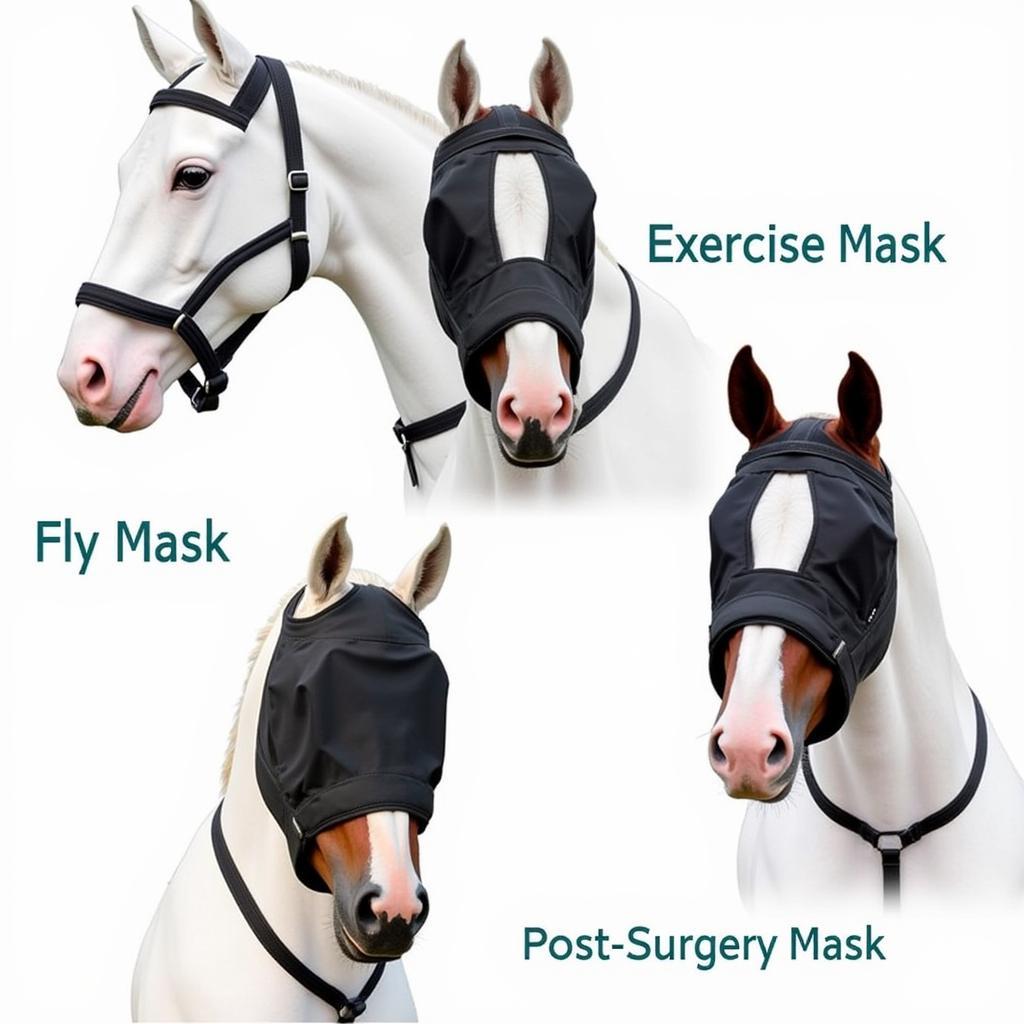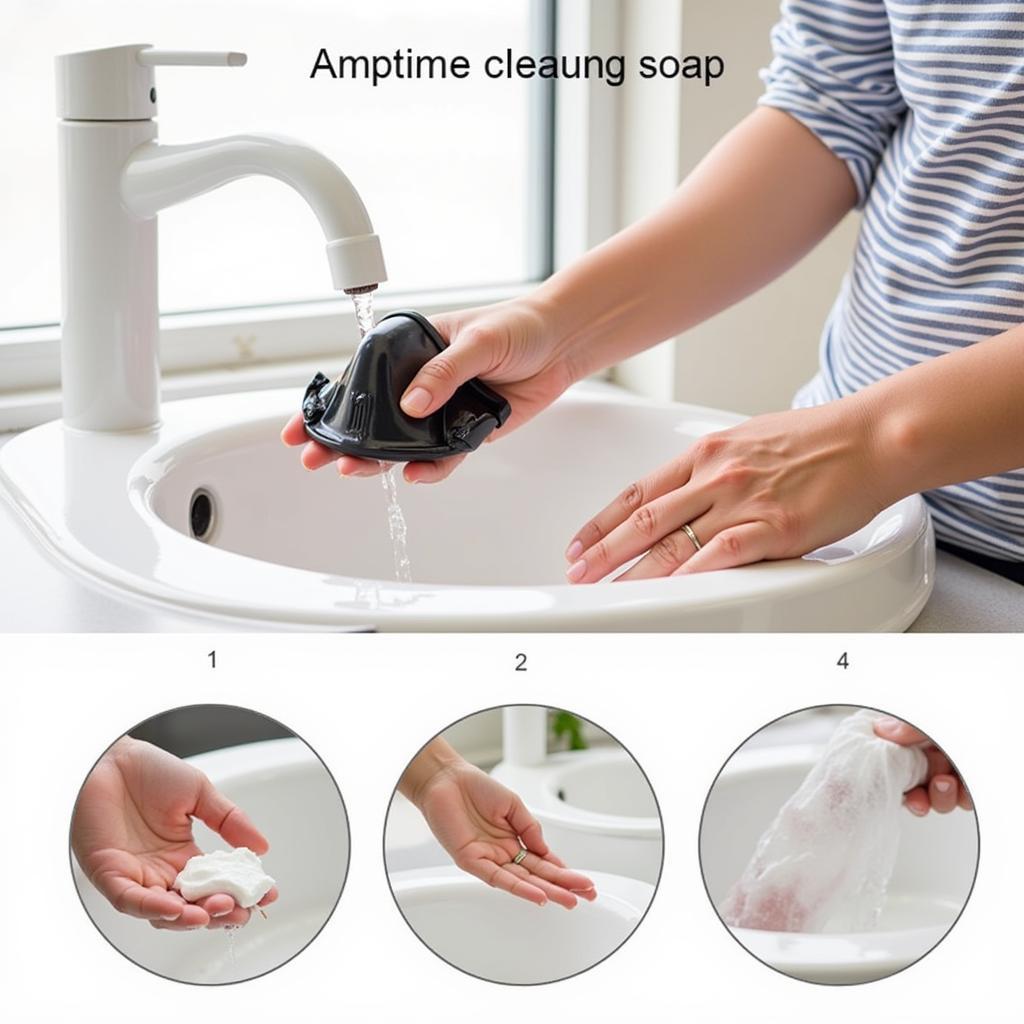Racing Horse Masks are an essential piece of equipment for certain disciplines within the equine world. Whether you’re involved in exercising racehorses, need to protect a sensitive horse from flies and insects, or are simply curious about their function and benefits, this comprehensive guide will delve into the world of racing horse masks. We’ll explore the various types, their uses, and how to choose the right one for your horse’s specific needs.
Types of Racing Horse Masks
There are several types of racing horse masks available, each designed for a specific purpose. Understanding these differences is crucial in making an informed decision. The most common types include:
- Fly Masks: These are arguably the most widely used type of horse mask. They are designed to protect the horse’s sensitive eyes and face from irritating flies, gnats, and other pesky insects. Fly masks come in various mesh sizes and materials, offering different levels of protection and visibility.
- Exercise Masks: These masks are specifically designed for use during training and exercise. They can help to reduce wind resistance, prevent debris from entering the horse’s nostrils, and even offer a slight calming effect for anxious horses. Some exercise masks are also designed to help maintain optimal respiratory function during strenuous activity.
- Post-Surgery Masks: These specialized masks are used after a horse has undergone surgery on its face or head. They help to protect the surgical site from dirt, flies, and other potential irritants, promoting healing and preventing infection.
 Types of Racing Horse Masks
Types of Racing Horse Masks
Choosing the Right Racing Horse Mask
Selecting the appropriate racing horse mask depends on several factors, including the intended use, the horse’s individual needs, and the environment.
Fit and Comfort
Proper fit is paramount. A poorly fitting mask can rub and cause sores, while a loose mask can easily slip off or become entangled. Look for masks that are adjustable and offer a secure, comfortable fit without restricting breathing or vision.
Material and Breathability
The material of the mask should be durable, breathable, and easy to clean. Mesh materials are commonly used for fly masks, offering good ventilation while keeping insects out. Exercise masks might be made from more aerodynamic materials like Lycra or spandex.
Visibility
Ensure the mask offers adequate visibility for the horse. This is particularly important for fly masks and exercise masks, as restricted vision can increase the risk of accidents.
Benefits of Using a Racing Horse Mask
The benefits of using a racing horse mask are numerous and can greatly improve a horse’s comfort and well-being.
- Protection from Insects: Fly masks effectively shield the horse’s eyes and face from irritating flies and other insects, reducing the risk of eye infections and allergic reactions.
- Reduced Wind Resistance: Exercise masks can minimize wind resistance, allowing the horse to breathe more easily and perform more efficiently during strenuous workouts.
- Respiratory Support: Some exercise masks are designed to improve airflow and reduce respiratory stress during exercise.
- Protection from Debris: Exercise masks can prevent dust, dirt, and other debris from entering the horse’s nostrils, protecting the delicate respiratory system.
- Calming Effect: Certain masks can have a calming effect on anxious or easily distracted horses, helping them focus during training or competition.
- Post-Surgical Protection: Post-surgery masks protect sensitive surgical sites from contamination, promoting healing and minimizing the risk of infection.
Caring for Your Racing Horse Mask
Proper care and maintenance are essential for ensuring the longevity and effectiveness of your racing horse mask. Regular cleaning removes dirt, sweat, and other debris, preventing the build-up of bacteria and ensuring the mask remains hygienic. Always follow the manufacturer’s cleaning instructions.
“A well-fitting and appropriately chosen racing horse mask can significantly improve a horse’s comfort and performance,” says Dr. Emily Carter, DVM, a leading equine veterinarian. “It’s an investment in your horse’s well-being.”
 Cleaning a Racing Horse Mask
Cleaning a Racing Horse Mask
Conclusion
Racing horse masks are a valuable tool for horse owners and trainers. From protecting against insects and debris to aiding in post-surgical recovery, these masks offer a range of benefits. By understanding the different types available and choosing the right one for your horse’s specific needs, you can contribute to their overall comfort, health, and performance. Remember, a well-fitted and properly maintained racing horse mask is an investment in your horse’s well-being.
FAQ
- How often should I clean my horse’s mask?
- What type of mask is best for my horse’s allergies?
- Can a racing horse mask be used on other breeds?
- Are there different sizes of racing horse masks available?
- What material is best for a fly mask?
- How can I tell if my horse’s mask fits correctly?
- Where can I purchase a racing horse mask?
“Choosing the correct racing horse mask is a crucial aspect of horse care,” adds John Miller, a seasoned horse trainer with over 20 years of experience. “It’s about understanding your horse’s individual needs and selecting the mask that best meets those needs.”
You can find more articles about horse care and equipment on our website. We also have a blog post specifically on choosing the right fly mask for your horse.
For any assistance, please contact us at Phone Number: 0772127271, Email: [email protected] Or visit us at: QGM2+WX2, Vị Trung, Vị Thuỷ, Hậu Giang, Việt Nam. We have a 24/7 customer service team.